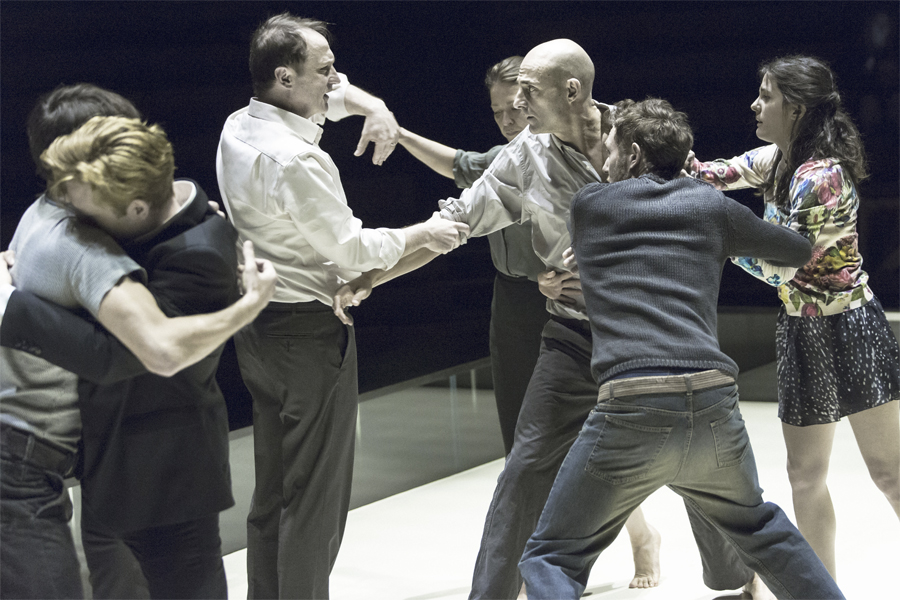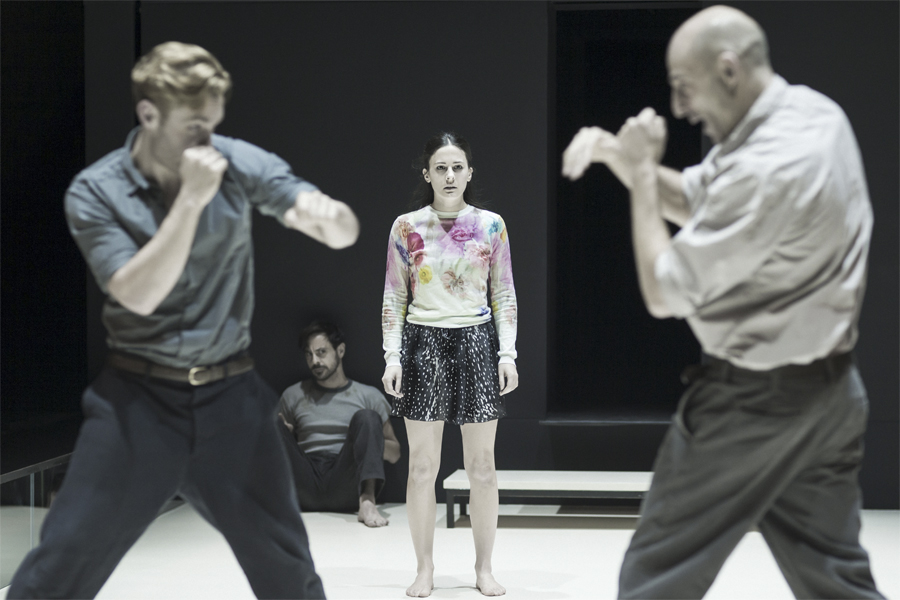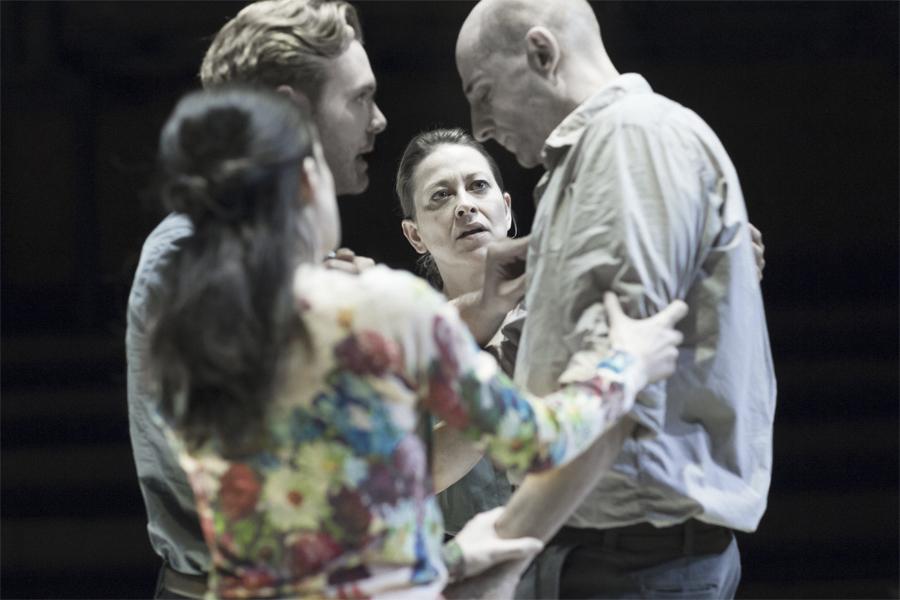 Thirty years ago, the great and influential Jewish theatre practitioner Peter Brook worked with writer Jean-Claude Carriere and a large cast from the company who had gathered around him in Paris to dramatise The Mahabharata: the Sanskrit epic of the mighty Bharata family torn apart by a great war. The result was nine hours of mesmerising epic theatre, which I was fortunate enough to see in a Glasgow tramshed transformed by red earth into the Indian subcontinent. Now aged 90, working with his long-term collaborator Marie-Hélène Estienne, he returns to just one section of the mighty epic, which they've called Battlefield.
Thirty years ago, the great and influential Jewish theatre practitioner Peter Brook worked with writer Jean-Claude Carriere and a large cast from the company who had gathered around him in Paris to dramatise The Mahabharata: the Sanskrit epic of the mighty Bharata family torn apart by a great war. The result was nine hours of mesmerising epic theatre, which I was fortunate enough to see in a Glasgow tramshed transformed by red earth into the Indian subcontinent. Now aged 90, working with his long-term collaborator Marie-Hélène Estienne, he returns to just one section of the mighty epic, which they've called Battlefield.
This meditation on the sorrow and pity of war, eloquent and moving in its extraordinary simplicity, is sadly both timely and timeless as we continue to commemorate two World Wars, while the world is ripped apart and whole peoples put to flight by conflict in Syria and elsewhere. Battlefield is about the aftermath of war and especially internecine struggle within dynasties, here two great families, the Pandavas and Kauravas. The five Pandava brothers may have triumphed over their cousins the hundred sons of the blind King Dritarashtra, but for Yudishtira, oldest of the Pandavas who must now become king, it is a Pyrrhic victory. He has lost so much and so many family members and confederates lie dead on the field of battle. So he finds he has all too much in common with the old blind King he has defeated.
And so many themes and threads in this story sound as familiar as the weekly Torah portions and Haftorah readings you can hear in synagogues around the world every Shabbat. For David’s lament over Saul and Jonathan, “The beauty of Israel is slain among thy high places,” and his later raw cry over the death of his traitor son Absalom, “Oh, Absalom, Absalom, my son…” resonate with the anguish of these survivors of battle, both victor and vanquished. There is even the story of a baby pulled from a river where his mother has abandoned him floating in a basket. His rescuers are princely and he grows up to be the mighty warrior Karna.
The glory of this production, little more than an hour long, is its stunning simplicity. It is performed on a thrust stage, again covered by that orange-red dust, by four powerful performers – at the same time physical and cerebral – who morph sinuously from one role to another as necessary. Nobody is credited with the simple design, but Oria Puppo’s streamlined costumes, echoing that theme of the modern and timeless, are enhanced by huge bolts of red and orange cloth to wonderful effect, serving as robes and cloaks, rivers, the elements of fire and earth, storms and even untold riches. Philippe Vialatte’s mood-making lighting too seems like an extra character. And the whole is brilliantly underscored and orchestrated by the drumming of master musician Toshi Tsuchitori, whose rhythms eloquently enhance and alter the mood and pace.
Stories are folded within stories, and amidst that sorrow and pity there are plenty of flashes of humour, albeit dark or rueful. Each performer is singular and all work wonderfully together. Sean O’Callaghan is a huge and imposing presence, especially moving as the blind and bereaved King Dritarashtra, but ruefully comical as a worm in danger of being crushed. To Jared McNeill falls the role of the victorious Yudishtira, as graceful – and abashed – in victory, as the vanquished old King he has toppled. While Ery Nzaramba is both funny and authoritative as the wise men whose advice to the king comes in the form of those parables about a succession of animals including that worm, as well as a pigeon and a mongoose.
Stately Carole Karemera (who plays the pigeon with comic economy) is as capable of huge dignity as the queenly women caught up in the struggle, principally Yudishtira’s mother Kunti, but it is her heartrending Ganga, her terrifying cry of grief and loss at the death of her son that I shall long remember – standing for every bereaved mother indeed.
“For an idea to stick it must be burnt into our memories,” says Brook in his hugely influential meditation on theatre, The Empty Space. The singularly funny and thought-provoking tale of a king who offers more and more of his body to be weighed in the scales against that pigeon till every bone is part of the weigh-in proves to be a telling and memorable metaphor. And then one of the wise men has a parable for the new King in which a mongoose tells a rich man to give away all his riches to the poor. He begins to involve the audience, homing in on various members asking if they are rich or poor. Some fess up to being rich, others assert they are poor and are ‘rewarded’ with some of those red and orange cloths. The last of these ‘lucky’ recipients finds his lap piled so high he cannot move and can barely applaud at the end. It is the image of this discomfiture, which so perfectly embodies the ambiguity of riches – and indeed victory – that sticks in my memory. The storytelling of Brook and Estienne accrues power even as they continue to strip it bare to the bone.
By Judi Herman
Battlefield runs until Saturday 27 February, 7.30pm & 2.30pm, £10-£35, at Young Vic Theatre, 66 The Cut, SE1 8LZ; 020 7922 2922. www.youngvic.org







